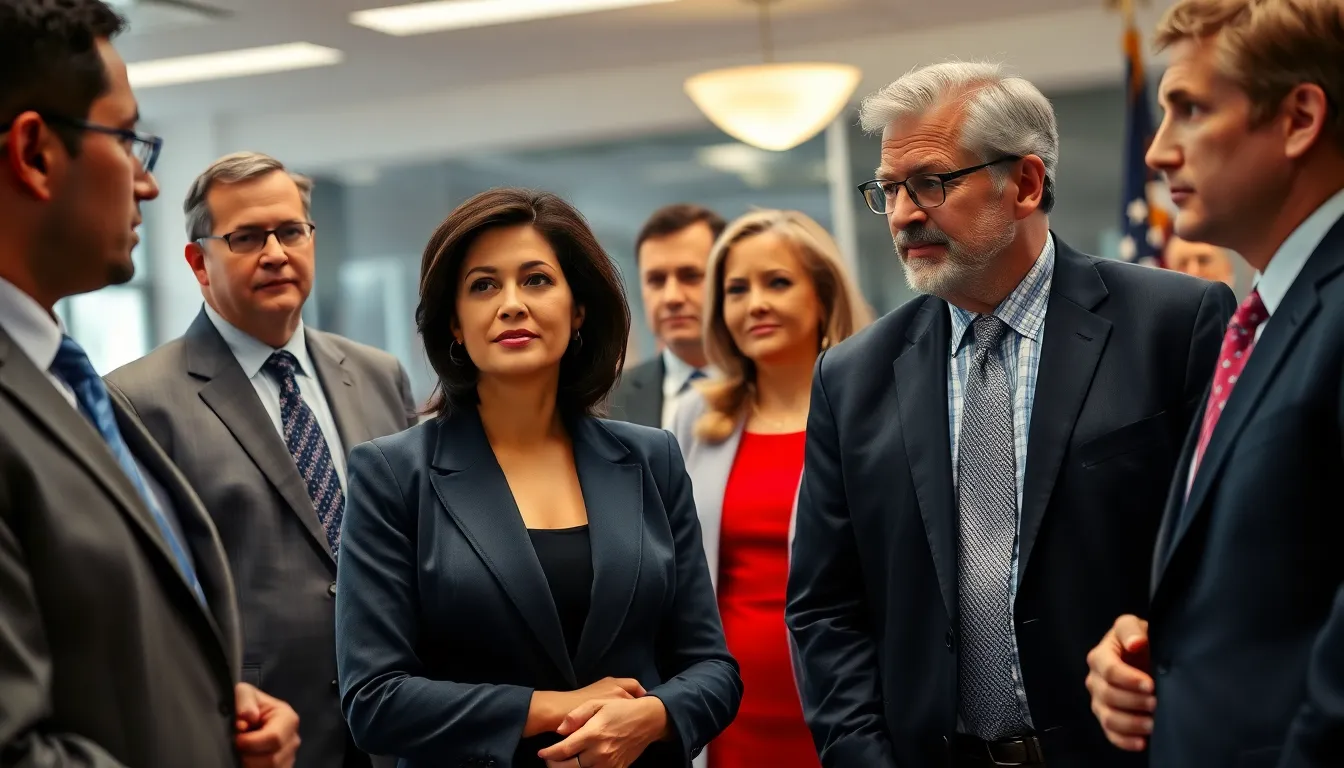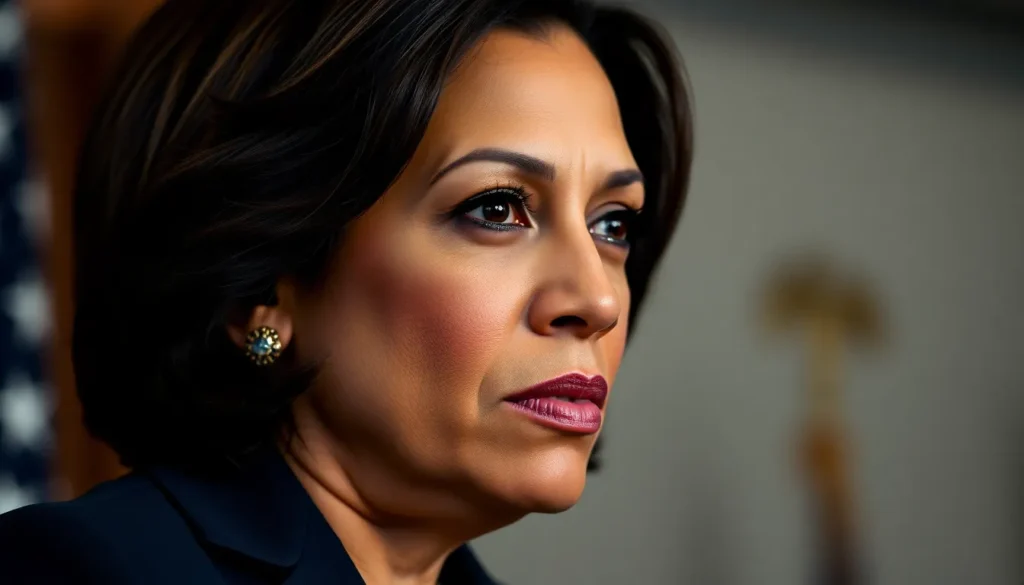Table of Contents
ToggleAs the political landscape shifts, one question looms large: who will Kamala Harris choose as her running mate? With the 2024 election on the horizon, the decision carries significant weight, not just for her campaign but for the future of the Democratic Party. The choice could shape policy priorities and influence voter turnout, making it a crucial strategic move.
Potential candidates are already sparking discussions, each bringing unique strengths and perspectives to the table. From seasoned politicians to rising stars, the possibilities are endless. As Harris navigates this pivotal moment, observers are eager to see how her selection will reflect her vision and values, setting the tone for a competitive election season.
Who Will Harris Pick As VP: An Overview
Harris’s decision on a vice-presidential pick carries immense weight for the 2024 election. Various candidates, each with unique qualifications, are under consideration. Potential choices include prominent figures known for their political experience and ability to strengthen the Democratic ticket.
Key Candidates
- Gavin Newsom
Newsom, the Governor of California, brings significant statewide influence and has a strong progressive track record.
- Stacey Abrams
Abrams, a prominent voting rights advocate and former State House Minority Leader in Georgia, has gained national recognition for her efforts to enhance voter participation.
- Pete Buttigieg
Buttigieg, the Secretary of Transportation and former Mayor of South Bend, Indiana, offers insights on infrastructure and urban issues, appealing to a diverse electorate.
- Elizabeth Warren
Warren, a U.S. Senator from Massachusetts, is known for her focus on economic inequality and consumer protection, garnering support from progressive voters.
- Val Demings
Demings, a Congresswoman from Florida and former police chief, brings law enforcement experience, resonating with moderates and progressives alike.
Strategic Considerations
Harris must weigh multiple factors in her selection process. She needs a running mate who complements her policies and expands her appeal among crucial voter demographics. Balancing regional representation, gender diversity, and political ideology remains critical for maximizing electoral success.
Anticipation and Implications
The anticipation surrounding Harris’s choice reflects the broader implications for the Democratic Party. Aligning with a candidate who resonates with progressive values could boost voter engagement, while selecting a moderate figure might attract swing voters. The ultimate selection will serve as a defining moment in shaping the party’s future direction heading into the election.
Current Political Landscape

The political landscape surrounding Kamala Harris’s VP selection remains dynamic and impactful. The ongoing challenges and achievements of the current administration influence how voters and party members perceive potential candidates.
Impact of the Current Administration
The Biden administration’s performance serves as a crucial backdrop for Harris’s decision. Issues such as inflation, healthcare, and climate change resonate deeply with voters. Positive developments, like infrastructure improvements and economic recovery efforts, strengthen the administration’s standing. However, challenges in partisan gridlock and divisions within the Democratic Party complicate perceptions. Harris’s VP choice can either reinforce the administration’s successes or address perceived shortcomings. Voter loyalty hinges on a cohesive strategy that reflects the administration’s priorities while appealing to a diverse electorate.
Key Players in the VP Selection
Several prominent figures emerge as key contenders in the VP selection process, each with unique backgrounds and political strengths.
- Gavin Newsom: California’s Governor, recognized for progressive policies and strong state leadership.
- Stacey Abrams: Notable voting rights activist, admired for her advocacy on voter access and engagement.
- Pete Buttigieg: Secretary of Transportation, known for his expertise in infrastructure and transportation policy.
- Elizabeth Warren: U.S. Senator, focused on economic inequality and consumer protection.
- Val Demings: Congresswoman with significant law enforcement experience, appealing to discussions on public safety.
Evaluating these candidates involves assessing their alignment with Harris’s ideology, ability to energize voter bases, and fit within the broader Democratic strategy aimed at maximizing electoral success. Each candidate’s regional and demographic appeal plays a vital role in the deliberation process.
Potential Candidates for VP
Kamala Harris faces several strong candidates for the VP position, each offering unique advantages for the 2024 election. The selection process involves balancing experience and fresh perspectives within the party.
Established Politicians
- Gavin Newsom: Governor of California focused on progressive policies such as climate change and healthcare reform. His leadership experience attracts voters who resonate with his bold initiatives.
- Stacey Abrams: Dynamic advocate for voting rights known for her grassroots mobilization. Her efforts in Georgia have increased voter participation, making her a compelling choice to energize the Democratic base.
- Pete Buttigieg: Former mayor of South Bend, Indiana, and current Secretary of Transportation, he brings insights into infrastructure and transportation, appealing to urban voters seeking sustainable development.
- Elizabeth Warren: U.S. Senator with a strong focus on economic inequality and consumer protection. Her plans for addressing wealth disparities could enhance voter engagement among progressives.
- Val Demings: Congresswoman with extensive law enforcement experience. Her perspective on criminal justice reform resonates with voters concerned about safety and accountability.
Rising Stars in Politics
- Alexandria Ocasio-Cortez: U.S. Representative known for her advocacy on climate action and social justice. Her influence among younger voters can reinvigorate the party’s appeal.
- Lauren Underwood: Congresswoman recognized for her work on healthcare access. Her narrative around improving public health resonates in discussions about pandemic recovery.
- Rashida Tlaib: U.S. Representative committed to fighting for marginalized communities. Her progressive stance aligns with voters seeking representation for diverse backgrounds.
- Michelle Wu: Mayor of Boston and proponent of sustainable urban initiatives, she embodies modern leadership appealing to younger, environmentally conscious voters.
Influence of Party Dynamics
Harris’s selection hinges on current party dynamics. The Democratic Party must address divisions between moderates and progressives. Selecting a VP candidate with broad appeal can inspire unity while attracting diverse voter segments. Balancing regional representation, gender diversity, and political ideology will strengthen electoral success. Party leaders assess candidates not only for their personal merits but also for how they complement Harris and resonate with the electorate’s evolving concerns.
Factors Influencing the Decision
Harris’s VP selection hinges on multiple factors, including voter demographics and the political experience of candidates. Understanding these influences is crucial for her campaign’s success.
Voter Demographics
Voter demographics play a significant role in shaping Harris’s choice for a running mate. Data shows that different demographic groups impact election outcomes. Key considerations include:
- Age: Younger voters tend to prioritize issues like climate change and social justice. Candidates appealing to this group, such as Alexandria Ocasio-Cortez, can energize younger voters.
- Gender: Gender representation remains critical. Selecting a female VP can reinforce the message of women’s empowerment, potentially appealing to female voters.
- Race and Ethnicity: Diverse representation matters. A candidate like Stacey Abrams can strengthen connections with Black voters and those advocating for voting rights.
- Geographic Location: Regional representation influences voter appeal. Candidates from battleground states can enhance Harris’s chances in crucial electoral areas.
Political Experience and Public Appeal
Political experience and public appeal significantly affect the decision-making process for a running mate. Key aspects to consider include:
- Track Record: Candidates with proven experience in governance, such as Gavin Newsom or Elizabeth Warren, can provide confidence in leadership capabilities.
- Public Perception: Candidates like Pete Buttigieg enjoy high favorability ratings, which could enhance Harris’s overall appeal to voters.
- Coalition Building: Selecting candidates with a history of building coalitions can help unite various factions within the Democratic Party, ultimately strengthening the ticket.
- Electability: The ability to sway undecided voters remains a priority. Harris must evaluate candidates who resonate broadly across the electorate.
Selecting a VP requires careful consideration of these influencing factors to create a cohesive, appealing campaign that responds to the diverse needs of American voters.
Predictions and Speculations
The anticipation surrounding Kamala Harris’s choice for her VP running mate intensifies as the 2024 election approaches. Political analysts share insights on potential candidates and the implications of each choice.
Opinions from Political Analysts
Analysts suggest several factors will influence Harris’s decision. They emphasize her need to select a candidate who complements her strengths and addresses any perceived weaknesses within the Biden administration. Gavin Newsom emerges as a frontrunner due to his experience in a key electoral state and progressive policies. Stacey Abrams gains recognition for her voter mobilization efforts, potentially galvanizing support among critical demographics. Analysts also note the appeal of Pete Buttigieg, whose focus on infrastructure could resonate amid ongoing economic concerns. Elizabeth Warren’s advocacy for economic equity also positions her as a compelling choice, particularly among progressive voters. Val Demings’s law enforcement background may bolster ticket appeal among moderates. Collectively, analysts highlight that Harris’s VP pick signals strategic choices aimed at maximizing voter turnout across diverse groups.
Historical Context of VP Selections
Historically, VP selections have played pivotal roles in election outcomes. Candidates often seek individuals who balance the ticket, addressing regional, ideological, or demographic gaps. For instance, Barack Obama’s choice of Joe Biden as his running mate expanded appeal to working-class voters and seasoned politicians. Similarly, George W. Bush’s selection of Dick Cheney tapped into experience and foreign policy expertise. Past successful picks appear to prioritize diverse backgrounds and complementary skill sets. Current political dynamics reflect these historical trends, as Harris’s choice must navigate a landscape of heightened partisan divisions and evolving voter expectations. The VP selection process not only influences party unity but also shapes the broader electoral narrative leading up to the election.
Kamala Harris’s selection for her vice presidential running mate is a pivotal moment for the 2024 election. The decision will not only influence her campaign but also shape the Democratic Party’s future direction. With a diverse pool of candidates, each offering unique strengths, Harris has the opportunity to enhance voter engagement and address key issues facing the electorate.
As the political landscape evolves, the choice will reflect the administration’s successes and challenges while aiming to unite various factions within the party. Voter demographics and political experience will play crucial roles in this decision, making it essential for Harris to choose a candidate who can resonate with a broad audience. The anticipation surrounding her pick continues to grow, highlighting the significance of this choice in the upcoming election.




